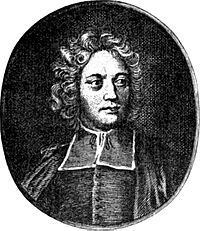- Charles-Irénée Castel de Saint-Pierre
-
Charles-Irénée Castel, abbé de Saint-Pierre (18 February 1658 – 29 April 1743) was an influential French writer and radical. After Georg von Podiebrad in his Tractatus, he was, perhaps, one of the first to propose an international organisation responsible for maintaining peace.
Contents
Life
Saint-Pierre was born at the château de Saint-Pierre-Église near Cherbourg where his father was bailli of the Cotentin. Saint-Pierre was unsuited to a military career due to poor health and was educated by the Jesuits.
Later as an adult his family connections introduced him to the salons of Madame de la Fayette and of the Marquise Henri de Lambert in Paris which he frequented. He was presented with the abbacy of Tiron, and was elected to the Academy in 1695 although he had produced no notable work to that date. In the same year he gained a footing at court as almoner to Madame.
He was a negotiator of the Treaty of Utrecht (1712-13), and this influenced him to develop his ideas for his project of universal peace among nations. In 1718, he published Discours sur la Polysynodie a book in which he was openly critical of the policy of the late Louis XIV, for his despotic rule and proposed the replacement of appointed ministers by elected councils. Later in 1718, in consequence of the political offence given by this work, he was expelled from the Academy.
He afterwards joined the Club de l'Entresol with Pierre-Joseph Alary, an independent society suppressed in 1731. He died in Paris on 29 April 1743.
Ideas
Saint-Pierre's works are almost entirely occupied with an acute though generally visionary criticism of politics, law and social institutions. They had a great influence on Rousseau, who left elaborate examinations of some of them. The abbot of Saint-Pierre can be seen as perhaps the first representative of the new ideas that heralded the Enlightenment.
Saint-Pierre was possibly the earliest person to mention the possibility of a European Union.[1]
Ideas contributed by de Saint-Pierre include
- An equitable tax system, including a graduated income tax,
- Free public education, for women as well as men,
- State improvement of transportation to further commerce,
- An international court and league of states (In Projet de paix perpétuelle 1713),
- A constitutional monarchy, aided by a system of councils and an academy of experts (In Discours sur la Polysynodie 1718).
Works
- Ouvrages de morale et de politique, Rotterdam, J.-D. Beman ; Paris, Briasson, 1733-1740
- Projet pour rendre la paix perpétuelle en Europe, Utrecht, A. Schouten, 1713
- Discours sur la Polysynodie, Amsterdam, Du Villard et Changuion, 1719
- De la douceur, Amsterdam, Briasson, 1740
References
 This article incorporates text from a publication now in the public domain: Chisholm, Hugh, ed (1911). Encyclopædia Britannica (11th ed.). Cambridge University Press.
This article incorporates text from a publication now in the public domain: Chisholm, Hugh, ed (1911). Encyclopædia Britannica (11th ed.). Cambridge University Press.
- ^ Hont, I. (2005) Jealousy of Trade: International Competition and the Nation-State in Historical Perspective. Cambridge: Harvard University Press
External links
- Saint-Pierre’s biography at the Academy Francais - In French, includes portrait.
Preceded by
Jean-Louis BergeretSeat 8
Académie française
1694-1743Succeeded by
Pierre-Louis Moreau de MaupertuisCategories:- 1658 births
- 1743 deaths
- People from Manche
- French nobility
- Expelled members of the Académie française
Wikimedia Foundation. 2010.

